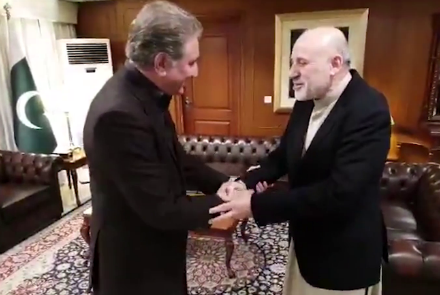The High Peace Council (HPC) on Friday said they expect Islamabad to take practical steps toward the Afghan peace process following President Ashraf Ghani's Special Envoy, Umer Daudzai's, visit to Islamabad.
According to HPC, if Pakistan seriously supports Afghanistan's peace process, the distrust between Kabul and Islamabad will be removed.
“We are waiting to witness the first practical steps of Pakistan after this visit and to see the lack of trust between Afghanistan and Pakistan removed,” HPC spokesman, Sayed Ehsan Taheri, said.
Meanwhile, HPC on Friday said Daudzai met Siraj-ul-Haq, head of Jamaat-e-Islami party, on Thursday during his four-day visit to Pakistan.
During the meeting, the two sides discussed key and practical issues for achieving peace in Afghanistan, read the statement.
According to the HPC, during the meeting Daudzai asked Siraj-ul-Haq to cooperate with the start of direct talks between the Afghan government and the Taliban.
The Pakistani religious leader vowed to cooperate with the Afghan peace process, the statement said.
In the meantime, Pakistan’s Foreign Minister, Shah Mahmood Qureshi, said Islamabad wants the Taliban to give up their refusal to talk to the Afghan government so that a political settlement on the 17-year-old conflict be negotiated.
“We want them to sit together. It is for Afghans to sort out their problems and as long as they do not sit down and talk to each other, outsiders can do little to help them,” Qureshi said as quoted by Dawn in a report published on Friday.
Meanwhile, the Afghan government said they hope Islamabad seriously supports the Afghanistan peace process.
“We hope that Pakistan by understanding that extremism is harmful both for Afghanistan and Pakistan, seriously support the Afghanistan peace process and put pressure on anti-government armed groups,” Omid Maisam, deputy spokesman of Chief Executive Officer Abdullah Abdullah, said.
In the meantime, President Ashraf Ghani’s National Security Advisor, Hamdullah Mohib, has gone to Beijing to seize China’s cooperation in the peace process.
Daudzai is on a four-day visit to Islamabad to hold talks with Pakistani officials as well as political and religious leaders.
He met with Pakistan foreign minister on January 8 where the two sides discussed the Afghan peace process and strengthening of bilateral relations between the two countries.
Meanwhile, on Thursday President Ghani’s special envoy met with Aftab Ahmad Khan Sherpao, chairman of Qaumi Watan Party, where they discussed the same matter.
The two sides stressed the need for cooperation on peace between Afghanistan and Pakistan, the HPC said in a statement.
Daudzai also met Asfandyar Wali Khan, head of Awami National Party, where they discussed the Afghan peace process, the regional situation and Pakistan’s role in these.
Taliban however, repeatedly, have rejected any talks with the Afghan government and Kabul have said if the group does not talk face to face with government, then peace will not be maintained.


